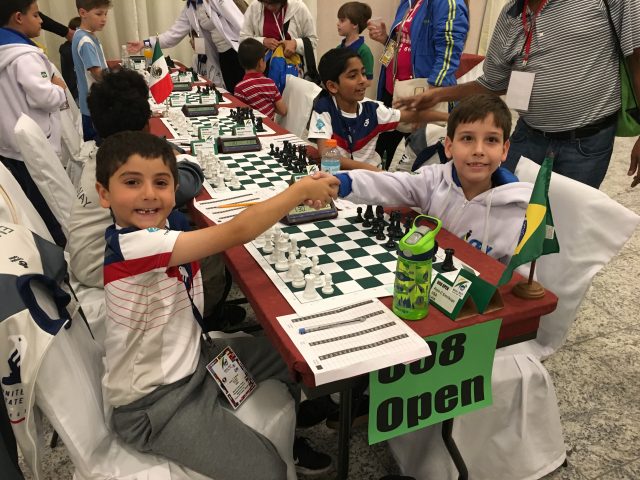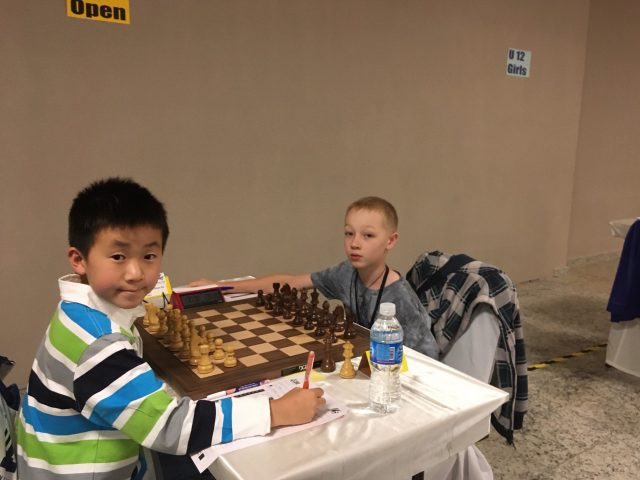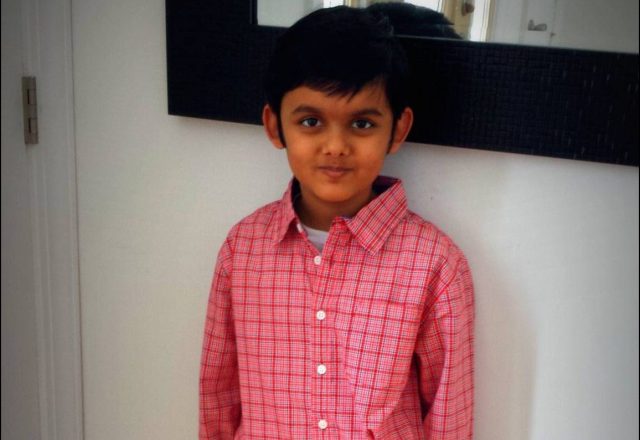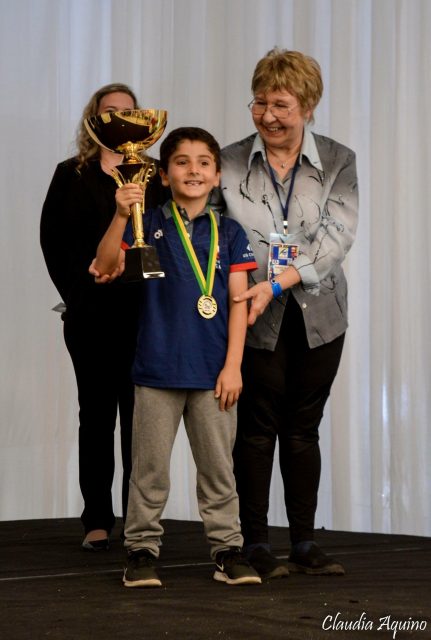It is 7am in Chicago, and the final round of the World Cadet Championship in Poços de Caldas, Brazil is about to begin. My eyes are glued to my cell phone, watching the games live as they begin. I force myself to put my phone down and close my eyes to sleep, as I have not slept the whole night. But, how can I sleep knowing that two of my students are playing for gold?
This story is about the new Under-8 World Champion, Aren Emrikian, and Under-10 Silver Medalist, Arthur Xu. It is about how they trained to achieve their goals, and how all motivated, ambitious chess players (and their parents) can use the same strategies to achieve their goals as well.
 Aren at the World Youth, wearing Two Sigma jacket
Aren Emrikian is a seven-year-old from the Chicago area. I started coaching him when he was five. At that time, he only knew how the pieces move. Within a few lessons, I realized that he is a very bright boy. I remember very clearly an important conversation that I had with Aren when he was still only five: I asked him if he was ready to train hard, so he could become a World Champion U-8, and he replied, “We can try.” On that day, I came up with a plan of intensive, yet not overwhelming, training. For the past two years, Aren would spend at least 2-3 hours a day studying chess. This is a how a typical week would look:
Aren at the World Youth, wearing Two Sigma jacket
Aren Emrikian is a seven-year-old from the Chicago area. I started coaching him when he was five. At that time, he only knew how the pieces move. Within a few lessons, I realized that he is a very bright boy. I remember very clearly an important conversation that I had with Aren when he was still only five: I asked him if he was ready to train hard, so he could become a World Champion U-8, and he replied, “We can try.” On that day, I came up with a plan of intensive, yet not overwhelming, training. For the past two years, Aren would spend at least 2-3 hours a day studying chess. This is a how a typical week would look:
Mesgen Amanov was born in 1986. He is a Grandmaster who has represented Turkmenistan national team in 4 Olympiads and numerous international tournaments. He graduated from Sport and Tourism University with a degree in Chess Coaching. In 2008, Mesgen moved to the USA, and now resides in Illinois. He has recorded over a hundred online video lessons for improvemychess.com
 Aren at the World Youth, wearing Two Sigma jacket
Aren at the World Youth, wearing Two Sigma jacket - 4 hours of analyzing grandmaster games from classical books.
- 3 hours of solving chess puzzles.
- 3 hours working on endgame studies.
- 2 hours working on improvemychess.com, the online training program I developed
- 2-3 hours playing correspondence chess online.
- 1.5 hours weekly private lessons.
- Bi-weekly group lessons at my chess academy; in my opinion, it is vital to collaborate with other kids.
- Finally, Aren would play in an average of two rated tournaments per month.
- Step 1: Find all games available online on your opponent.
- Step 2: Analyze your opponent’s games, identify his or her weaknesses and, most importantly, determine which openings he or she generally plays.
- Step 3: Skype Meeting.
[pgn]
[Event "World Cadets Chess Championship"]
[Site "?"]
[Date "2017.08.29"]
[Round "?"]
[White "Pham, Tran Gia Phuc"]
[Black "Emrikian, Aren C"]
[Result "0-1"]
[ECO "E04"]
[Annotator "Aren Emrikian"]
[PlyCount "60"]
[EventDate "2017.??.??"]
1. d4 d5 2. c4 e6 3. Nf3 Nf6 4. g3 dxc4 5. Bg2 {This is the Catalan opening.}
Nc6 6. O-O a6 7. Qa4 $2 {An opening mistake. Nc3 was the correct move.} (7. Nc3
Rb8 8. e4 Be7 9. Qe2 b5 10. Rd1 O-O 11. d5 exd5 12. e5 d4 13. exf6 Bxf6 14. Qe4
Bb7 15. Nd5 Nb4 16. Nxf6+ Qxf6 17. Qf4 c5 (17... Qxf4 18. Bxf4) 18. Qxf6 gxf6
19. Bf4 Rbc8 20. Bd6 Rfd8 21. Be7 Re8 22. Bxf6 h6 {these are all of the best
moves. They are part of the opening and I have checked
them with the engine.}) 7... b5 8. Qd1 {It's clear that my opponent just lost
two important tempi, now I am just up a pawn} Bb7 (8... Rb8 {This was also
possible, but Iiked Bb7 better.} 9. b3 cxb3 10. axb3 Be7) 9. Ne5 Nd5 10. f4 $2
{I am not sure why he played this. I suppose the point is to try to attack, but
the center is open. You do not normally attack when the center is open, and
this is no exception.} Be7 11. e4 {White should try to play energetic,
otherwise they just down a pawn} Nf6 12. Be3 O-O {finally I finished my
development and now I am ready for action} 13. g4 {Pawn storm, but I am not
afraid} Nxe5 14. fxe5 Nd7 {Black is already winning here. This is because of
white's two errors.7.Qa4 and 10.F4. Only two errors, but the errors
were big ones!} (14... Nxe4 {Another line. Both moves are good.although the
engine says that Nd7 is better.} 15. Qc2 Bg5 16.
Qe2 f5 {and black is winning.}) 15. Bf4 Bg5 {My moves are easy to find, I am
up a pawn and I want to trade pieces} 16. Qd2 Bxf4 17. Qxf4 {If I had played 17.
C5,he would have had a even greater advantage,but the move I played,Qe7 is
good too.} Qe7 (17... c5 18. d5 f6 19. exf6 (19. dxe6 Nxe5 20. Nc3 Qd4+ 21. Kh1
Rae8 22. Rad1 Nd3 23. Qc7 Ba8) 19... Rxf6 20. Qd6 (20. Qe3 Rxf1+ 21. Bxf1 exd5
22. exd5 Qe8 23. Qxe8+ Rxe8 24. Nc3 b4 25. Na4 Re4 26. Rd1 Rxg4+ 27. Kf2 Rf4+
28. Kg3 Re4 29. Kf2 g5) 20... exd5 21. Rxf6 Qxf6 22. Qxf6 (22. Qxd7 Qd4+ 23.
Kf1 Rf8+ 24. Ke1 Qf2+ 25. Kd1 Qxg2) 22... Nxf6) 18. Re1 {If I had played F6,
my advantage would have been even greater,but my move Nb6 is fine to.} Nb6 {
19. Nc3 was better, but White would still be losing.} 19. Qe3 Rad8 {d4 pawn is
a weakness and I need to pile up on it} 20. Nc3 Rd7 21. Rad1 Rfd8 {22.a3 was
better,but white would still be losing.} 22. Rd2 c5 {After this move, the White
center falls and White was never able to attack on the kingside.} 23. Ne2 {
My opponent was also in time trouble and it is hard to suggest good moves for
him} cxd4 24. Nxd4 Qc5 25. Red1 b4 26. Kh1 c3 27. Rd3 Nc4 28. Qg5 {If I had
played Rxd4 I would have lost to Qxd8.I did not see this, but I wanted to be
careful, so I avoided Rxd4.} h6 29. Qc1 Rxd4 30. Rxd4 Rxd4 {Here my opponent
resigned. After this game I gained confidence and my coach told me that I am
finally warmed up. From this point on I won all my games.} 0-1
[/pgn]
This game I remember very well as I was watching it live on Tuesday August 28 while having a private lesson. We were trying to predict Aren’s moves and surprisingly Aren played the best moves, not according to the chess engine of course, but at least how my student and I would play.
[pgn]
[Event "World Cadets Chess Championship"]
[Site "?"]
[Date "2017.08.31"]
[Round "?"]
[White "Mishra, Abhimanyu"]
[Black "Emrikian, Aren C"]
[Result "0-1"]
[ECO "C54"]
[Annotator "Aren Emrikian"]
[PlyCount "114"]
[EventDate "2017.??.??"]
1. e4 e5 2. Nf3 Nc6 3. Bc4 Bc5 4. c3 Nf6 5. d3 {This is the Giuoco Piano.} O-O
(5... d6 {this is another line.} 6. O-O O-O 7. b4 Bb6 8. a4 a6 9. Nbd2 Be6) 6.
O-O d5 7. exd5 Nxd5 8. b4 {This was a little surprising for me. Now, I was out
of my preparation. After 5-10 minutes thought, I played the only move, Be7.
All other moves, would lose a piece.} (8. Re1 {this is what i was expecting.}
Bg4 9. Nbd2 (9. h3 {we thought he might play this as well.} Bh5 10. Nbd2 Nb6
11. Bb5 Bd6 12. Ne4 Re8 13. Ng3 Bg6 14. Bg5 Qd7) 9... Nb6 10. Bb5 Bd6 11. h3
Bh5 12. Ne4 Re8 13. Ng3 Bg6 14. Bg5 Qd7 (14... f6)) 8... Be7 (8... Bb6 {
I breifly considered this, but because of bxd5, Bb6 would be a blunder.} 9.
Bxd5 Qxd5 10. c4 Qd8 11. c5) 9. Qb3 Nb6 10. Be3 Bf5 {I thought of playing Nxc4
instead, but i rejected it because it would open the d-file, and my queen is
on the d-file. However, Nxc4 is the best move as it trades white's good bishop,
and I can move the queen if it comes under attack by Rd1.} (10... Nxc4 {
This is the correct move.} 11. dxc4 Qd3 12. Nbd2 Rd8 13. Rfd1 Be6) 11. Rd1 (11.
Bxb6 {This is correct.} cxb6 12. Re1) 11... Qc8 {Nxc4 is less human move now,
because after dxc4 the rook directly attacks my queen, but I can just play Qc8.
Even so Nxc4 is still best move.} (11... Nxc4 12. dxc4 Qc8) 12. a4 Nxc4 {
I played this now because I had now made the capture perfect with no problems.
(However, it would have been better to do it before.)} 13. dxc4 Qe6 14. Ne1 {
I was very suprised by this. I do not no why he played it.} Rad8 15. Nd2 Bg4 {
I played this because I wanted to provoke F3.} 16. f3 Bh5 17. Ne4 f5 18. Nc5
Bxc5 {Qc8 would have been better, as it is hard to make progress for white.
Then Black b6 and white is worse (GM Mesgen)} 19. Bxc5 Rfe8 20. Nd3 b6 21. Bf2
Rd7 {This was a mistake. My plan was to double up on the f-file, but that
really doesn't help me. F4 was best.} (21... f4 22. Kh1 Bg6 23. Ne1 Rxd1 24.
Rxd1 e4 25. fxe4 Bxe4 {and I would be much better.}) 22. Nb2 Rf7 23. Re1 Qg6
24. Kh1 Ref8 {Again, this is the wrong plan.} 25. c5 Kh8 26. cxb6 cxb6 27. Nc4
e4 28. f4 {Now I started to feel uncomfortable. I felt that my position was
cramped.} Qh6 29. Be3 Rf6 30. b5 Ne7 31. Ne5 {Now I am worse, and I thought I
was going to lost. But I told myself not to give up.} Bf7 32. Qb4 Re8 33. c4
Ng6 34. Qc3 Qh5 35. Nxf7+ $6 {I think this was a mistake. I traded my bad
bishop for his good knight.} (35. Rad1) (35. c5 bxc5 36. Qxc5 {This was best.})
35... Rxf7 36. a5 Qg4 37. axb6 axb6 38. Rf1 Rd7 39. Qa3 h6 40. Qa6 Nh4 41. g3
$4 {Now white is lost. Rg1 would have been better.} (41. Rf2) (41. Rg1 Nf3 42.
Rgf1 {and white would be fine.}) 41... Qe2 $1 {Now white is lost and I knew it.
} 42. gxh4 Qxe3 {After this, I easily converted. My moves are natural and easy
to find.} 43. Rae1 Qc5 44. Qa2 e3 45. Qe2 Rd2 46. Qxd2 exd2 47. Rxe8+ Kh7 48.
Rd1 Qxc4 {there is no way for white to save his rook} 49. Re3 Qc2 50. Rxd2 Qxd2
51. Rg3 Qd5+ 52. Kg1 Qxb5 53. Kg2 Qe2+ 54. Kg1 b5 55. h3 Qe1+ 56. Kh2 Qxg3+ 57.
Kxg3 b4 {He resigned here because I am going to queen the b-pawn. Overall, the
game was played well by both of us. He was never completely lost until he
played 41.g3?? After that, he was lost.} 0-1
[/pgn]
If properly motivated we can see that sometimes desire to win overpowers the desire to draw. In this game Mishra offered a draw twice, which would clinch him the gold medal. In my opinion under any conditions young players shall never play for a draw. To make it simple for my young students, I made a rule: “Never agree to a draw nor offer one.” This simple guidance eliminates any thinking about offering a draw or playing for a draw. It is better to lose the game and gain experience rather than agree to a draw and end the game prematurely. At this young age, kids must develop bravery and a desire to win. If you see that your kid or student is trading pieces too much, almost in every game, this is a sign that he is aiming for a “peaceful” result.
Mishra’s desire to draw is easy to understand, draw would give him a World Champion U-8 title. Analyzing Mishra’s games I see and realize how strong he is. This boy has a bright future in chess and if he continues working as hard as he is now, he might become the youngest grandmaster in the US.
Now, let’s see if Arthur and Aren’s three year age gap change their game quality and analysis.
[pgn]
[Event "World Cadets Chess Championship"]
[Site "?"]
[Date "????.??.??"]
[White "Xu, Arthur"]
[Black "Marc Andria, Maurizzi"]
[Result "1-0"]
[ECO "B80"]
[WhiteElo "1903"]
[BlackElo "1947"]
[Annotator "ArthurXu"]
[PlyCount "85"]
1. e4 c5 2. Nf3 d6 {After he played this move I thought that he had prepared
something against me because he deviated from his normal Kalashnikov.} 3. d4
cxd4 4. Nxd4 Nf6 5. Nc3 e6 {I was already out of my
preperation. I knew that he had to have some intense preparation to play
something this new. But I was wrong and I knew it when he started to play slowly
instead of blitzing out preperation.} 6. Be3 Be7 7. f3 a6 8. Qd2 b5 9. O-O-O
Bb7 10. g4 Nc6 11. h4 Qa5 12. Kb1 Ne5 13. g5 Nfd7 {We had played some pretty
standard moves and got out of the opening at about right here, but I had a
little advantage because by now he was probably somewhere at about 20 minutes
less than me. This was I think because he didn't really play this setup and I
knew it better than him.} 14. Nb3 Qc7 15. Qf2 {My idea was to stop Nb6 and
Nxf3.} (15. Be2 Nb6 {This isn't bad, but it bothered me a lot because of the
threat Nc4.}) 15... Rc8 16. Rc1 Nc4 $6 {He should not have gone for all of
this action yet, as he has not castled. Castling would have been better than
Nc4.} (16... O-O {Now I may have gone for h5 or Be2.} 17. h5 (17. Be2 d5 18.
exd5 exd5 19. f4)) 17. Bxc4 Qxc4 {I think he played well by taking on c4 with
his queen because if he took with the pawn, he would have to switch his queen and
rooks to the B lane to attack my king.} (17... bxc4 $6 18. Nd4 Rb8 19. h5) 18.
h5 Ne5 19. Bb6 {A tricky move, though I could be more prophalytic and play a3
or create action immediately and play h6 or maybe even g6. I want to play Na5
winning the bishop and maybe trapping the queen.} (19. a3 O-O 20. h6 g6 21. Na5) (19.
h6 g6 20. Bb6) (19. g6 $5 $44 {Sacrificing a pawn, but getting some
compensation.} hxg6 20. hxg6 Nxg6 (20... Rxh1 $2 {The file is mine for
attacking and he has no pawn.} 21. gxf7+ Nxf7 22. Rxh1) 21. Rxh8+ Nxh8 22. Rh1
Ng6) 19... Qc6 (19... O-O {If he does nothing, I will play} 20. Na5 Qb4 21. a3
$18) 20. Bd4 {I think I am slightly better here because his best move is Rg8
but that doesn't allow him to o-o.} Rg8 21. f4 Nc4 22. g6 (22. h6 {
A better move for me may have been this.} g6) 22... hxg6 23. hxg6 f6 24. Rhe1 {
From a human standpoint, White is probably better because I have a weakness to
attack on g7.} Bd8 (24... b4 $132 {This is probably better to attack than stay
passive.} 25. Nd1 Qb5 26. Ne3 $13) 25. Qh4 e5 26. Qh7 Rf8 27. fxe5 fxe5 28. Rf1
$1 {Already the weaknesses are being exploited. His king is also open. With
that and the little time he has, I am close to winning.} Be7 (28... Rxf1 {
If he tries funny business...} 29. Rxf1 exd4 30. Qxg7 dxc3 (30... Be7 31. Rf7
Qc7 32. Qh8+ Kd7 33. Qh3+ Kd8 34. g7 $18 {With some precise moves, I am
completely winning.}) 31. Rf8#) (28... exd4 {This horrendous as here follows}
29. Rxf8+ Kxf8 (29... Kd7 30. Rf7+ Ke8 (30... Ke6 31. Qh3+ Ke5 32. Qf5#) 31.
Qg8#) 30. Qh8+ Ke7 31. Qxg7+ Ke6 32. Qf7+ Ke5 33. Qf5#) 29. Qxg7 $1 {Creating
counterattack and just leaving the B hanging.} exd4 (29... Rxf1 30. Rxf1 exd4
31. Rf7 Qc7 32. Qh8+ Kd7 33. Qh3+ Ke8 34. Qe6 dxc3 35. g7 $18 {I am down
material, but the weak king and strong attack decides the game.}) 30. Rxf8+
Bxf8 31. Qf7+ Kd8 32. Qxf8+ Kc7 33. Nd5+ Kb8 34. g7 $18 {By now the game is
over.} Rxf8 35. gxf8=Q+ Ka7 36. Nxd4 Qd7 37. Rg1 Qh3 38. a3 Qh2 39. Rg8 Qh1+
40. Ka2 a5 41. Nxb5+ Ka6 42. Nbc7+ Ka7 43. Qb8# {Overall, the game was played
well by both of us. My opponent lost mainly
because he wasn't creating enough counterplay to bother me, so I could just
attack freely. If my opponent passed the opening stage of the game with a fair
amount of time, the tables may have turned. } 1-0
[/pgn]
Arthur's general advice to youngsters is: " I think the most important things you need to succeed in the tournament is good preparation, wise use of time, good training if not intense, a healthy condition, getting through the opening safely. And of course, make good moves."
I truly enjoyed Arthur’s analysis. In it, we can see his understanding of prophylactic moves, understanding of the weaknesses in the opponent’s camp. His calculation and positional understanding is on a very high level, and I like how Arthur feels the initiative and does not waste time, while taking care of his own King.
Arthur started chess when he was five years old. It was five years ago when I first met him, and I certainly remember that Arthur knew how the pieces move and most of the rules (except the en passant!). I had a different strategy back in 2012: I would teach my students chess through the openings. We would go over moves and try to understand why each move was played. We never tried to memorize moves during the lesson, as Arthur could do it at home, because all our moves would be recorded in a chessbase file. Daily puzzles and playing online was a “must” home routine for Arthur. At least once a month, I would show all fundamental endgame positions and assign homework on certain endgames. Arthur also analyzed grandmaster games and played two tournaments in a month. My friends Grandmaster Dmitry Gurevich and Grandmaster Vladimir Georgiev played an important role in Arthur’s development as well.
Here is a brief list of the chess books that I recommend for chess players who are seeking to improve their game:
- Understanding Chess Move by Move by John Nunn (I recommend for rating 1000-1700.)
- The Mammoth Book of the World’s Greatest Chess Games by Graham Burgess, John Emms, John Nunn (I recommend for rating 1200-2300)
- Quality Chess Puzzles by John K. Shaw (I recommend for rating 1000-2300)
- Chess Evolution - all series by Arthur Yusupov (I recommend for rating 1500-2500)
 ABOUT THE AUTHOR
ABOUT THE AUTHOR
Mesgen Amanov was born in 1986. He is a Grandmaster who has represented Turkmenistan national team in 4 Olympiads and numerous international tournaments. He graduated from Sport and Tourism University with a degree in Chess Coaching. In 2008, Mesgen moved to the USA, and now resides in Illinois. He has recorded over a hundred online video lessons for improvemychess.comCategories
Archives
- January 2026 (13)
- December 2025 (27)
- November 2025 (29)
- October 2025 (39)
- September 2025 (27)
- August 2025 (29)
- July 2025 (43)
- June 2025 (25)
- May 2025 (24)
- April 2025 (29)
- March 2025 (29)
- February 2025 (20)
- January 2025 (24)
- December 2024 (34)
- November 2024 (18)
- October 2024 (35)
- September 2024 (23)
- August 2024 (27)
- July 2024 (44)
- June 2024 (27)
- May 2024 (31)
- April 2024 (51)
- March 2024 (34)
- February 2024 (25)
- January 2024 (26)
- December 2023 (29)
- November 2023 (26)
- October 2023 (37)
- September 2023 (27)
- August 2023 (37)
- July 2023 (47)
- June 2023 (33)
- May 2023 (37)
- April 2023 (45)
- March 2023 (37)
- February 2023 (28)
- January 2023 (31)
- December 2022 (23)
- November 2022 (32)
- October 2022 (31)
- September 2022 (19)
- August 2022 (39)
- July 2022 (32)
- June 2022 (35)
- May 2022 (21)
- April 2022 (31)
- March 2022 (33)
- February 2022 (21)
- January 2022 (27)
- December 2021 (36)
- November 2021 (34)
- October 2021 (25)
- September 2021 (25)
- August 2021 (41)
- July 2021 (36)
- June 2021 (29)
- May 2021 (29)
- April 2021 (31)
- March 2021 (33)
- February 2021 (28)
- January 2021 (29)
- December 2020 (38)
- November 2020 (40)
- October 2020 (41)
- September 2020 (35)
- August 2020 (38)
- July 2020 (36)
- June 2020 (46)
- May 2020 (42)
- April 2020 (37)
- March 2020 (60)
- February 2020 (38)
- January 2020 (45)
- December 2019 (34)
- November 2019 (35)
- October 2019 (42)
- September 2019 (45)
- August 2019 (56)
- July 2019 (44)
- June 2019 (35)
- May 2019 (40)
- April 2019 (48)
- March 2019 (61)
- February 2019 (39)
- January 2019 (30)
- December 2018 (29)
- November 2018 (51)
- October 2018 (45)
- September 2018 (29)
- August 2018 (49)
- July 2018 (35)
- June 2018 (31)
- May 2018 (39)
- April 2018 (31)
- March 2018 (26)
- February 2018 (33)
- January 2018 (30)
- December 2017 (26)
- November 2017 (24)
- October 2017 (30)
- September 2017 (30)
- August 2017 (31)
- July 2017 (28)
- June 2017 (32)
- May 2017 (26)
- April 2017 (37)
- March 2017 (28)
- February 2017 (30)
- January 2017 (27)
- December 2016 (29)
- November 2016 (24)
- October 2016 (32)
- September 2016 (31)
- August 2016 (27)
- July 2016 (24)
- June 2016 (26)
- May 2016 (19)
- April 2016 (30)
- March 2016 (36)
- February 2016 (28)
- January 2016 (32)
- December 2015 (26)
- November 2015 (23)
- October 2015 (16)
- September 2015 (28)
- August 2015 (28)
- July 2015 (6)
- June 2015 (1)
- May 2015 (2)
- April 2015 (1)
- February 2015 (3)
- January 2015 (1)
- December 2014 (1)
- July 2010 (1)
- October 1991 (1)
- August 1989 (1)
- January 1988 (1)
- December 1983 (1)










